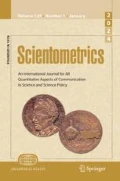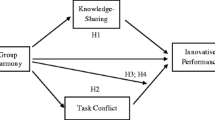Abstract
A theoretical approach was developed to raising the effectivenes of research groups as adaptable systems. If performance is the aim of the research group, adaptation to the changing conditions in the research process has to be one of its essential principles underlying its development. Empirically it was shown that several independent components of the cooperation structure that were simultaneously adapted to different changing conditions exerted a strong influence on performance. There is the hypothesis that the principle of adaptation of cooperation structure can be generally extended to the adaptation of other group characteristics.
Similar content being viewed by others
References
S. D. HAITUN,Naukometria. Sostoyanie i perspektivy, Izdatelstvo Nauka, Moscow, 1983.
J. KOLOTYRKIN, Researven zur effektiveren Nutzung des wissenschaftlichen Potentials, In:Sowjetwissenschaft GWB, Nr. 1/1975.
P. B. SCHELISCHTSCH,Dinamika nauki, Leningrad ‘Nauka’, Leningradskoye otdelenja, 1981.
D. DE SOLLA PRICE, D. De B. BEAVER, Collaboration in an invisible college,American Psychologist, 21 (1966) 1011.
D. C. PELZ, F. M. ANDREWS,Scientists in Organisation, Rev. ed., Ann Arbor, Michigan, Institute for Social Research, The University of Michigan, 1976.
H. KRETSCHMER, Cooperation stucture, group size and productivity in research groups,Scientometrics, 7 (1985) 39.
Y. DE HEMPTINNE, J. L. ROBINSON, N. VISART DE BOCARMÉ, A Cybernetic Approach to the Management of Research Units, Unesco/NS/ROU/556/prov., Paris, September 1982.
U. GEISSLER, Wissenschafliche Tätigkeitsformen in ihrer Anfordeungssperifik für die Leistung, in:Faktroen der Intensivierung der Forschungsarbeit in Gruppen, Akademie der Wiessenschaften der DDR, Institut für Theorie, Geschichte und Organisation der Wissenschaft, Heft 50 (Berlin 1985).
H. KRETSCHER, Struktur und Leistung in Forschungsgruppen, in:Faktoren der Intensivierung der Forschungsarbeit in Gruppen, Akademie der Wissenschaften der DDR, Institut für Theorie, Geschichte und Organisation der Wissenschaft, Heft 50 (Berlin 1985).
K. LÜDTKE, Zum Zusammenhang zwischen dem Strukturniveau in dex Koopeartion/Kommunikation und Fortschritten in der wissenschaftlichen Arbeit, in:Faktoren der Intensivierung der Forschungsarbeit in Gruppen, Akademie der Wissenschaften der DDR, Institut für Theorie, Geschichte und Organisation der Wissenschaft Heft 50 (Berlin 1985).
H. PARTHEY, Analyse und Typologie der Forschungssituation in Forschungsgruppen, in:Faktoren der Intensivierung der Forschungsarbeit in Gruppen, Akademie der Wissenschaften der DDR, Institut für Theorie, Geschichte und Organisation der Wissenschaft, Heft 50 (Berlin 1985).
J. TRIPOCZKY, Zur Funktion von Normen in Forschungsgruppen, in:Bedingungen und Faktoren der Intensivierung der wissenschaftlichen Arbeit in Forschungsgruppen, Forschungsbericht 1984, unveröff.
D. WAHL, Die Arbeitsteilung in Forschungsgruppen, in:Bedingungen und Faktoren der Intensivierung der wissenschaftlichen Arbiet in Forschungsgruppen. Forschungsbericht 1984, unveröff.
K. D. KNORR, R. MITTERMEIER, G. AICHHOLZER, G. WALLER, Individual Publication Productivity as a Social Position Effect in Academic and Industrial Research Units, in: F. M. ANDREWS, (Ed.),Scientific Productivity, Cambridge University Press, UNESCO, 1979.
F. M. ANDREWS, The international study: Its data sources and measurment procedures, in: F. M., ANDREWS, (Ed.),Scientific Productivity, Chambridge University Press, UNESCO, 1979.
R. STANKIEWICZ,Leadership and the performance of research groups, RPI Research Policy Institute, University of Lund, 1980.
B. KRAUSE, P. METZLER,Angewandte Statistik, Berlin 1983.
H. KRETSCHMER, Representation of a complex structure measure for social groups and its application to othe structure of citations in a journal,Scientometrics, 5 (1983) 5
R.-L. WINKLER, Zu Kooperationsformen in Forschungsgruppen, Akademie der Wissenschaften der DDR. Institut für Theorie, Geschichte und Organisation der Wissenschaft, Studien und Forschungsberichte, Teil I, 1977.
Author information
Authors and Affiliations
Rights and permissions
About this article
Cite this article
Kretschmer, H. The adaptation of the cooperation structure to the research process and scientific performances in research groups. Scientometrics 12, 355–372 (1987). https://doi.org/10.1007/BF02016679
Received:
Revised:
Issue Date:
DOI: https://doi.org/10.1007/BF02016679




